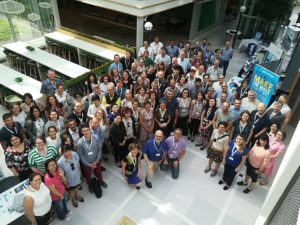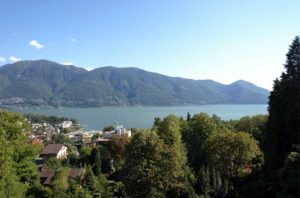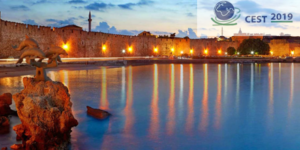
The CEST biennial series was launched in 1989 and it has become one of the leading environmental events worldwide where experts, scientists, entrepreneurs and representatives of public administration & social initiatives present state-of-the-art research and address current and emerging environmental key issues. All the papers selected for either oral or poster presentation undergo a rigorous review process with the conference proceedings included in databases, such as, the Science Citation Index (ISI) and SRCosmos. Since 2015, all papers presented in CEST are submitted to cooperating journals for review and publication in special issues.
The conference is hosted by the University of the Aegean in Greece in collaboration with the Region of South Aegean (Greece), the University of Salerno (Italy) and the Imperial College London (UK). It is also supported by UNESCO’s World Water Assessment Programme. The main organiser is Global NEST (Network of Environmental Science and Technology). With members from over 60 countries, Global Nest is a multi-disciplinary, international scientific movement which focuses on innovative environmental issues. CEST2019 coincides with the celebration of the 30-year anniversary of the series.
CEST biennial series has become one of the worldwide leading environmental event gathering experts, scientists, entrepreneurs as well as representatives of public administration and social initiatives presenting state-of-the-art research and addressing emerging environmental issues. The previous event, CEST2017, was the most successful event since the series was initially launched in 1989, with 460 participants from 75 countries originating from 6 continents (Europe, Asia, Africa, North America, South America and Australia). The programme included 415 oral and 253 poster presentations from 25 unique research areas. Participants also benefited from the interaction with 15 distinguished scientists that were invited and delivered keynote and plenary talks.
All the papers that are selected for either oral or poster presentation undergo a review process. As a result of the improving quality of the papers in previous conferences, their proceedings have been included in databases, such as Science Citation Index (ISI) and SRCosmos. Since 2015, the papers that are presented in CEST, are submitted to cooperating journals for review and publication in special issues.
CEST2019, coincides with the celebration of the 30 years anniversary (1989-2019) of CEST series and we are aiming to make it a memorable event.
During CEST2019 you will have the opportunity to:
- present and discuss your research with scientists from around the world
- expand your network
- attend presentations covering all the latest trends and innovations in the field of environmental science and technology
- meet with our prestigious invited speakers (to be announced)
- enjoy the island of Rhodes, one of the most famous Greek touristic attractions!
WHO SHOULD ATTEND:
Policy and decision makers, Academics, Researchers, Thought leaders, Government officials, CEOs, VPs, Directors, GMs, Engineers and scientists, Entrepreneurs and business owners, Students.
CONFERENCE SPONSORSHIP:
Email: cest2019@aegean.gr and tel: +30 210 6492452
CONFERENCE SECRETARIAT
Email: cest@gnest.org and tel: +30 210 6492451
VENUE
85100 Rhodes, Greece
REGISTRATION:
Early Bird Discount (Ends 5 June 2019): Pass for Scientific Committee Members (500€ per delegate), Standard Registration (550€ per delegate), Student Pass (350€ per delegate) and Corporate Pass (600€ per delegate)
Registration (From 6 June 2019): Pass for Scientific Committee Members (550€ per delegate), Standard Registration (600€ per delegate), Student Pass (400€ per delegate) and Corporate Pass (650€ per delegate)
On Site Registration (4-7 September 2019): Pass for Scientific Committee Members (600€ per delegate), Standard Registration (700€ per delegate), Student Pass (400€ per delegate) and Corporate Pass (750€ per delegate)
The deadline for paper submission is 8 May 2019. More info as well as registration and submission of papers are available at http://cest.gnest.org.
KEY THEMES
1 – WATER AND WASTEWATER TREATMENT AND REUSE
1.1 – Water treatment
1.2 – Wastewater treatment
1.3 – Advanced oxidation processes
1.4 – Water and wastewater reuse
1.5 – Desalination
2 – HYDROLOGY AND WATER RESOURCES
2.1 – Process understanding through innovative sensors and remote sensing
2.2 – Model hypothesis testing, diagnostics and causality
2.3 – River systems in diverse climates and environments
2.4 – Estimation and prediction under past and future conditions (climate, population, land use change)
2.5 – Prediction in ungauged basins and prediction under uncertainty
2.6 – Operational and impact-based forecasting and data assimilation
2.2 – Floods, droughts and water scarcity
2.8 – Water and climate services-challenges and user-tailored developments
2.9 – Water policy, management and society
2.10 – Water, Energy and/or Food Nexus
2.11 – Hydrological education and cooperative experiments (exchange programmes and virtual labs)
3 – WASTE MANAGEMENT
3.1 – Solid waste management
3.2 – Food waste
3.3 – Hazardous waste management
3.4 – Biowaste
3.5 – Microplastics in the marine environment
3.6 – Electric and electronic waste
4 – ENVIRONMENTAL MANAGEMENT AND POLICIES
4.1 – Spatial environmental planning
4.2 – Environmental impacts of tourism and Sustainable tourism development
4.3 – Climate change mitigation and adaptation
4.4 – Disaster risk reduction and management
4.5 – Marine environment and coastal management
4.6 – Water management in arid communities
5 – ENVIRONMENTAL POLLUTION
5.1 – Soil and groundwater contamination and remediation
5.2 – Environmental odour, monitoring and control
5.3 – Air pollution
5.4 – Emerging pollutants
5.5 – Heavy metals in the environment
5.6 – Efficient water resources management in Cr (VI) impacted water bodies
6 – ECOLOGY AND ECOSYSTEM MANAGEMENT
6.1 – Lakes, rivers, estuaries and ecosystem health
6.2 – Agroforestry, Forest and Agricultural Sustainability
6.3 – Wetlands Protection and Restoration
7 – ANALYSIS OF ENVIRONMENTAL SYSTEMS
7.1 – Environmental data analysis and modelling
7.2 – Energy technologies and sustainability
7.3 – Life cycle analysis (LCA)
7.4 – Atmospheric chemistry and physics
8 – ENVIRONMENTAL HEALTH
8.1 – Biomonitoring
8.2 – Urban environment and health
8.3 – Pollution control and public health
8.4 – Drinking water safety
8.5 – Antibiotic resistance
8.6 – Environmental exposures and human health
8.7 – The Non-Ionizing radiation from Wireless technology: A 21 Century Revolution or a Global pollution and Health hazard
9 – INNOVATIVE ENVIRONMENTAL SOLUTIONS
9.1 – Green chemistry
9.2 – Circular economy and industrial symbiosis
9.3 – Nanomaterials in the environment: applications and effects
9.4 – Environmental Biotechnology and Bioenergy
 The RSC’s Environmental Science journals are proud to support the 7th International Conference on Emerging
The RSC’s Environmental Science journals are proud to support the 7th International Conference on Emerging Contaminants – EMCON 2021. The conference will be held virtually on September 13-14th, 2021.
Contaminants – EMCON 2021. The conference will be held virtually on September 13-14th, 2021.











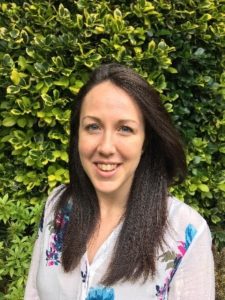
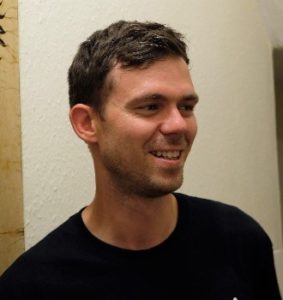
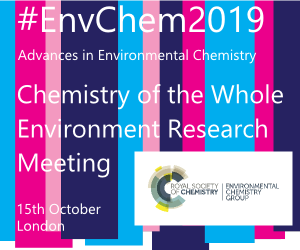

 The
The 